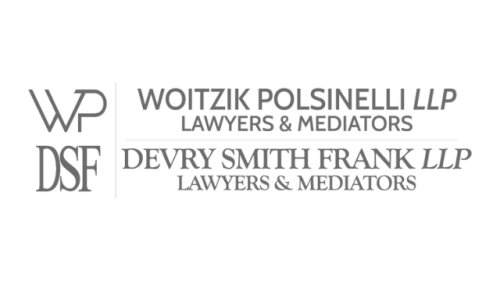Best Nonprofit & Charitable Organizations Lawyers in Whitby
Share your needs with us, get contacted by law firms.
Free. Takes 2 min.
List of the best lawyers in Whitby, Canada
About Nonprofit & Charitable Organizations Law in Whitby, Canada
Nonprofit and charitable organizations in Whitby, Canada, play a crucial role in supporting social, cultural, educational, and humanitarian initiatives. These organizations operate with the primary purpose of serving the public good, rather than generating profits for owners or shareholders. The legal framework that governs nonprofits and charities in Whitby is largely shaped by federal and provincial laws, mainly the Canada Not-for-Profit Corporations Act (CNCA), the Ontario Not-for-Profit Corporations Act (ONCA), and the Income Tax Act of Canada. Understanding these laws is important, as compliance affects how organizations are formed, governed, and how they maintain their tax-exempt or charitable status.
Why You May Need a Lawyer
Legal advice can be crucial for nonprofit and charitable organizations at various stages and for many reasons. Here are common situations where seeking legal help is recommended:
- Establishing a new nonprofit or charity, including choosing the most appropriate legal structure and drafting foundational documents.
- Applying for registered charity status with the Canada Revenue Agency (CRA).
- Ensuring compliance with federal and Ontario laws, regulations, and reporting requirements.
- Drafting or reviewing bylaws, policies, and governance documents.
- Guidance with managing boards of directors or resolving governance disputes.
- Advice on employment matters, contracts, or leasing property.
- Legal compliance surrounding fundraising, receipting donations, and recordkeeping.
- Managing mergers, restructuring, or winding down the organization.
- Navigating complex issues involving grants, government funding, and liability risks.
- Responding to audits or legal actions brought against the organization.
Local Laws Overview
Whitby, as part of Ontario, is primarily governed under the Ontario Not-for-Profit Corporations Act (ONCA), which applies to most nonprofits incorporated in the province. For charities, the requirements of the Canada Revenue Agency (CRA) as outlined in the Income Tax Act must also be met for federal charitable registration and tax benefits. Some key aspects include:
- Incorporation: Nonprofits can be incorporated provincially under ONCA or federally under CNCA, each with distinct processes and compliance requirements.
- Governance: Organizations must have bylaws and a board of directors, whose duties, rights, and liabilities are clearly defined under law.
- Charitable Status: Charities must register with the CRA to issue tax receipts for donations and must meet annual compliance and reporting obligations.
- Reporting: Nonprofits and charities are required to file annual returns with provincial or federal authorities and keep accurate financial records.
- Fundraising & Receipting: There are specific rules on what qualifies as a charitable donation and how receipts should be issued.
- Employment Law: As employers, nonprofits must comply with Ontario employment standards and human rights laws.
- Privacy: Organizations handling personal information must adhere to privacy legislation such as PIPEDA or Ontario’s privacy laws.
Frequently Asked Questions
What is the difference between a nonprofit and a charity?
A nonprofit is an organization formed for purposes other than earning profits for its members, such as social, cultural, or educational aims. A charity is a specific type of nonprofit that is registered with the CRA and can issue tax receipts for donations. Charities must meet stricter criteria and reporting standards.
How do I start a nonprofit or charity in Whitby?
To start a nonprofit, you must draft and file incorporation documents according to ONCA (or the CNCA for federal incorporation), adopt bylaws, and appoint a board of directors. To become a registered charity, you must then apply to the CRA with detailed information about your organization’s purposes and activities.
Do nonprofits and charities have to pay taxes?
Nonprofits are generally exempt from income tax but might still owe taxes such as GST/HST on purchases. Registered charities have additional tax advantages but must comply with strict CRA rules.
Can a nonprofit make a profit?
Yes, nonprofits and charities can generate surplus income, but those funds must be reinvested in their mission or operations, not distributed to members or directors.
Who regulates nonprofits and charities in Whitby?
Nonprofits are regulated by Ontario (or federal) corporate law authorities, while charities are regulated by both the provincial authorities and the CRA.
What are the reporting requirements for nonprofits and charities?
Nonprofits must file annual returns with the appropriate provincial or federal body. Charities must file annual T3010 returns with the CRA and provide detailed financial and activity reports.
What are directors’ legal responsibilities?
Directors have fiduciary and legal duties to act honestly, in good faith, and in the organization’s best interests. They must ensure legal compliance and sound management.
How does a nonprofit or charity accept donations?
Charities registered with the CRA can issue official tax receipts. Nonprofits that are not registered charities can accept donations but cannot offer tax receipts for charitable purposes.
Can nonprofits and charities employ staff?
Yes, they can hire paid staff, but must comply with provincial employment laws, including minimum wage, working hours, and employment standards.
How can a nonprofit or charity wind up operations?
Winding up requires a formal dissolution process. Charities must distribute remaining assets to other qualified donees. Both nonprofits and charities must notify relevant government bodies and file final reports.
Additional Resources
If you need more information, the following resources can be helpful:
- Ontario Ministry of Public and Business Service Delivery (for ONCA guidance and incorporation)
- Canada Revenue Agency Charities Directorate (registration and compliance for charities)
- Imagine Canada (resources and sector advocacy)
- Ontario Nonprofit Network (provincial advocacy and support)
- Whitby Chamber of Commerce or local community foundations
- Durham Region Legal Clinic (for legal help and referrals)
Next Steps
If you are considering establishing or currently manage a nonprofit or charitable organization in Whitby, it's important to ensure full legal compliance and good governance practices. Here are the recommended steps:
- Outline your organization’s mission and confirm whether it should be a nonprofit, charity, or another structure.
- Consult initial resources and familiarize yourself with ONCA, CRA requirements, and best practices.
- Reach out to local legal professionals or law firms specializing in non-profit and charity law for tailored advice.
- Prepare key documents, such as articles of incorporation, bylaws, and applications for registration.
- Implement ongoing compliance measures, including proper recordkeeping, regular board meetings, and timely filings.
- If facing complex issues, disputes, or regulatory challenges, seek legal counsel as soon as possible.
Navigating the regulatory landscape of nonprofits and charities can be challenging, but with the right guidance and support, your organization can effectively serve its mission and the Whitby community.
Lawzana helps you find the best lawyers and law firms in Whitby through a curated and pre-screened list of qualified legal professionals. Our platform offers rankings and detailed profiles of attorneys and law firms, allowing you to compare based on practice areas, including Nonprofit & Charitable Organizations, experience, and client feedback.
Each profile includes a description of the firm's areas of practice, client reviews, team members and partners, year of establishment, spoken languages, office locations, contact information, social media presence, and any published articles or resources. Most firms on our platform speak English and are experienced in both local and international legal matters.
Get a quote from top-rated law firms in Whitby, Canada — quickly, securely, and without unnecessary hassle.
Disclaimer:
The information provided on this page is for general informational purposes only and does not constitute legal advice. While we strive to ensure the accuracy and relevance of the content, legal information may change over time, and interpretations of the law can vary. You should always consult with a qualified legal professional for advice specific to your situation.
We disclaim all liability for actions taken or not taken based on the content of this page. If you believe any information is incorrect or outdated, please contact us, and we will review and update it where appropriate.









